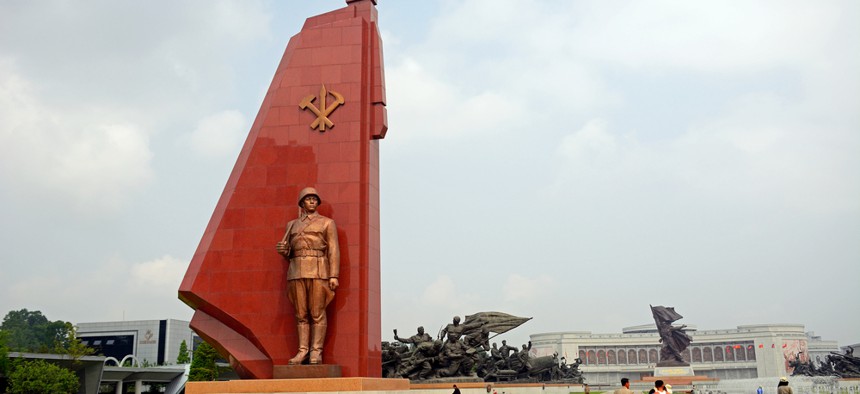
The Victorious War Museum is a Pyongyang museum. Attila JANDI / Shutterstock.com
How Will the U.S. Punish North Korea?
The U.S. has little economic leverage over North Korea without the help of Russia and China, but their support may be difficult to secure.
President Obama has promised to retaliate against North Korea for the large-scale hack of Sony Pictures Entertainment, but actual details about any planned U.S. action are few: the president only said last week before departing for Hawaii that the American response would be "proportional."
North Korea's Internet connection on Monday experienced large-scale outages, but officials would not say if the U.S. was behind the development. State Department spokeswoman Marie Harf said only that "as we implement our responses, some will be seen, some may not be seen." North Korea's connection was restored after 9 hours and 31 minutes of downtime.
Retaliating in kind by targeting North Korea's information infrastructure (if the U.S. was indeed behind the outage) could be a shot over the bow for North Korean leaders, but the U.S.'s preferred mode of punishment—economic sanctions—may prove more difficult to pull off.
North Korea is already a pariah state burdened with a wide range of U.S. and international sanctions. Those sanctions on the North Korean regime's financial system and travel were toughened most recently in March 2013, when the U.S. led the U.N. Security Council in punishing North Korea for its nuclear weapons program. The U.N. resolution strengthened existing rules that limited the country's trade and banking, and put pressure on countries to search suspicious cargo from North Korea.
At this point, the U.S. conducts almost no trade with the country, which leaves the administration with minimal leverage when it comes to targeting the North Korean economy.
To sanction North Korea effectively, the U.S. would have to team up with Russia and China, which have historically been North Korean leader Kim Jong-Un's most generous patrons. China provides North Korea with extensive aid in the form of food, energy, and military support, and much of North Korea's telecommunications run through Chinese networks. And Russia forgave90 percent of North Korea's debt in April, starting talks to build a railway and gas pipeline through the Korean peninsula.
Russia and China also happen to be two powers with which the U.S. has recently experienced a great deal of tension.
"North Korea can't exist without Chinese help," says Thomas Henriksen, senior fellow at Stanford University's Hoover Institute and author of America and the Rogue States. "They provide the fuel they burn, they provide the food, and they provide all kinds of diplomatic interference at the U.N."
The U.S. has already asked China to help dampen North Korea's ability to launch cyberattacks like the one that targeted Sony, the New York Times reported on Saturday, but has yet to hear back.
But even if China does cooperate, Russia can still undercut any punitive action by providing North Korea with an out. "The Russians see an opportunity here, see, to skewer the United States, to twist the eagle's feathers," Henriksen says. "The sanctions aren't going to do much good because the Russians will offer their banks." And Russia seems to be cozying up to North Korea: just last week, Russian President Vladimir Putin invited Kim Jong-Un to a May celebration in Moscow.
Nonetheless, Rep. Ed Royce, chairman of the House Foreign Affairs Committee, says there's still room for the U.S. to cut off North Korea from the international banking system. Speaking on the Hugh Hewitt Show last Wednesday, Royce said the U.S. pressure banks that lend to the North Korean government to freeze North Korean accounts. This worked in 2007, Royce said, when the U.S. targeted a bank in Macau that was holding North Korean funds.
The House passed a bill to impose similar sanctions again in July, but the Senate didn't take up the measure. Royce, who sponsored the bill, promised to send it again to the new Republican Senate once the 114th Congress convenes in January.
Of course, the U.S. could respond to North Korea without turning to economic sanctions: other possibilities include a cyber counterattack or even, though unlikely, military action.
Obama did not rule out any options in his Friday conference, maintaining only that the U.S. response would be "proportional." But short of a military intervention, which seems far-fetched in a time where 3,000 ground troops in Iraq make many at home uneasy, it will be hard to strike back at Kim Jong-Un without somehow getting Russia and China on board.
Image via )







